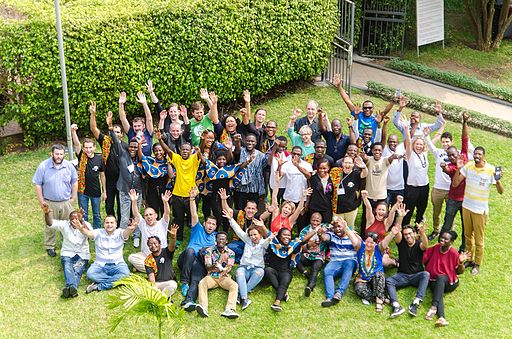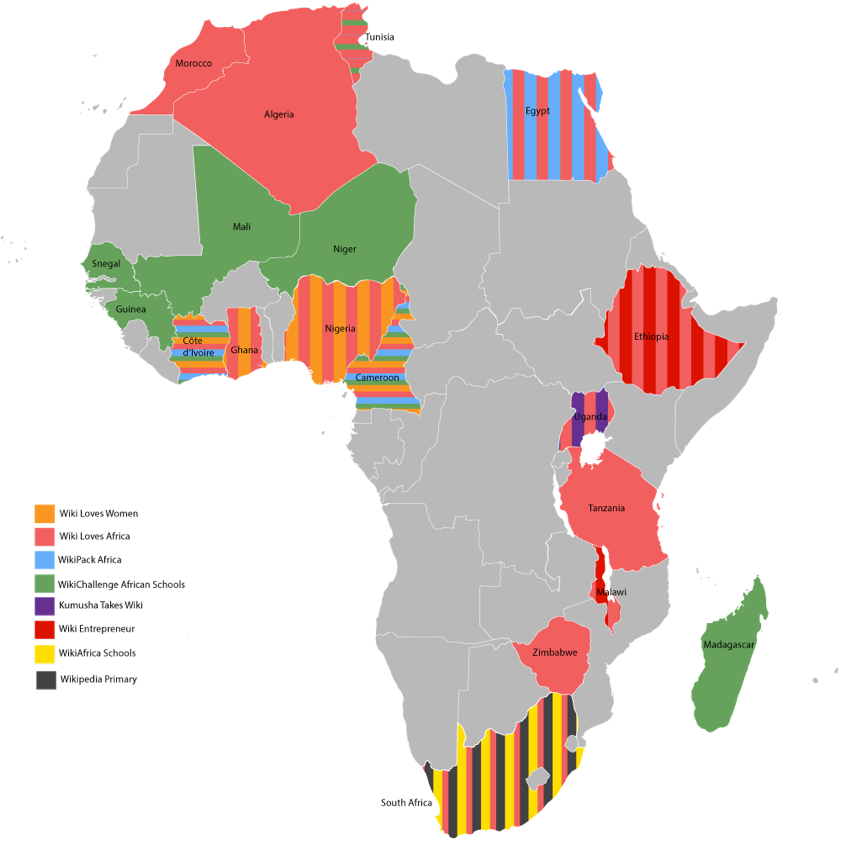The term ”wikimedia” is used as the name for the community of Wikipedia contributors (or Wikipedians) and other sister projects (Wikimedia Commons, WikiSource etc.). This community exists across the world! Most of the contributors work on their contributions to Wikipedia via their computers, tablets or phones. But others choose to connect with other contributors, and meet in the real...
The term ”wikimedia” is used as the name for the community of Wikipedia contributors (or Wikipedians) and other sister projects (Wikimedia Commons, WikiSource etc.). This community exists across the world! Most of the contributors work on their contributions to Wikipedia via their computers, tablets or phones. But others choose to connect with other contributors, and meet in the real world and organise projects that encourage new contributors, or generate content. When you are a contributor behind your screen, it is not always easy to know who the other contributors are living near you and to know where, when, or how to meet them. It can be a challenge to know what other contributors are organising in your country or where you live. The information below is provided to help you contact local communities.
The name of Wikimedia, and of the projects covered by it, is a portmanteau of the word ”wiki” and the identifier. A ”wiki” is a freely editable software management system. The ”Wiki” word is used in the same way by other organisations to mean the same thing, and can sometimes cause confusion with other wiki projects which have no link with Wikimedia, like WikiLeaks, territorial wikis or … with WikiFundi!
Wikimedia is part of the Wikimedia Foundation and is the umbrella term for all the projects supported by that foundation. Wikimedia Foundation, Inc. is a non-profit organisation that hosts the online Wikipedia encyclopaedia project and its sister projects (such as Wiktionary, Wikiquote, Wikibooks, Wikidata, Wikimedia Commons, Wikisource, Wikispecies, Wikinews, Wikivoyage and Wikiversity). All the projects have been developed on the Mediawiki software.
In around forty countries, Wikimedia associations exist and name themselves Wikimedia + the name of country (Example: Wikimedia South Africa). These associations gather users and participants of Wikimedia projects. These associations are recognised as ‘local associations’ or ‘chapters’ by the Wikimedia Foundation, but they are financially and juridically independent entities which follows distinct rules and direction. Moreover, there are also some Wikimedia UserGroups. Usually, usergroups are groups with a more flexible structure than the associations or chapters, but they also benefit from being part of the Wikimedia network. The groups and associations are most often managed by volunteers only, although some of the bigger associations sometimes employ people (this is the case in France or in Germany). The size of the associations and groups varies considerably, from a few individuals to hundreds of members.

Africa’s Wikimedians as delegates at Wiki Indaba 2017 in Ghana.
On the African continent, there are a few number of associations and user groups… simply because there are only a few contributors. Nevertheless, this is the list of existing groups in 2017:
In Ghana, the Open Foundation West Africa is not yet an affiliate, but is active in Wikimedia.
It must be noted that certain associations from other countries are also regularly active on the African continent. Some of these are (non-exhaustive list):
Chapters and usergroups act to support Wikimedia projects and their contributors. It can be done in several ways… for example:
If you have the chance to live in a country where an association or a usergroup is present, do not hesitate to contact them.
Beyond associations and user groups, there are a certain number of slightly isolated wikipedians who will also organise meetings and projects. If needed, do not hesitate to join the email discussion list (quite low traffic) to introduce yourself to the persons present in your close environment: (it’s possible to discuss in both French and English).
If you plan to create a UserGroup, please get in touch with the Affiliation Committee.
WikiAfrica is an international movement that takes place on the African continent and beyond. It encourages individuals, interested groups and organisations to create, expand and enhance online content about Africa. This involves motivating for the representation of the continent’s contemporary realities and history, its peoples and its innovations on the world’s most used encyclopaedia, Wikipedia. WikiAfrica is not owned by one organisation and it belongs to all people and organisations contributing to its scope.
In its various guises and hosted at several institutions (including Lettera27, Africa Centre, Ynternet.org, and Wikimedia CH), the WikiAfrica movement has consistently instigated and led multi-faceted innovative projects. These projects have activated communities and driven content onto Wikipedia. Examples include Share Your Knowledge, #OpenAfrica training Courses and Toolkits, Kumusha Bus (in Ethiopia and Ghana), WikiEntrepreneur (in Ethiopia and Malawi), Kumusha Takes Wiki (Cote d’Ivoire and Uganda) and Wiki Loves Africa.
Over 2016/17 it is working on Wiki Loves Women (in collaboration with the Goethe-Institut), WikiPack Africa, WikiFundi and the WikiChallenge African Schools (funded by the Orange Foundation), WikiAfrica Schools (funded by lettera27), Wikipedia Primary (funded by SUPSI) and Wiki Loves Africa (funded by Wikimedia Foundation).
WikiAfrica was started in 2006 as a collaboration between Wikimedia IT and lettera27, since then – via the support of several organisations and the work of a few people – it has grown to embrace the continent and build communities. It has been pivotal in driving the current contributions done by communities across sub-Saharan Africa.
The projects detailed below form the main backbone of the WikiAfrica movement. They have all been conceptualised, instigated and led by three members of Wiki In Africa, although until 2017 through the agency or fiscal sponsorship of different organisations.
2006
2009
2011
2012
2013
2014
2015
2016
2017

The organisations that have hosted or are collaborating on Wiki Africa projects include: